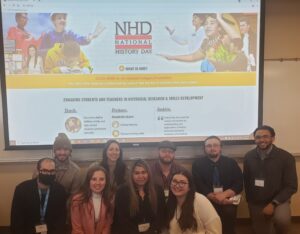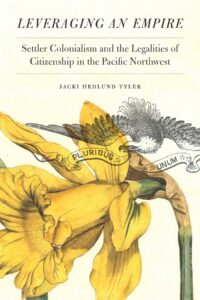 By Vickie Shields
By Vickie Shields
Michael Conlin, PhD, is a professor of history and current president of the United Faculty of Eastern (UFE). I recently caught up with Professor Conlin, to discuss his new book, One Nation Divided by Slavery: Remembering the American Revolution While Marching toward the Civil War.
VS: Why was it important for you to take on this subject matter at this time?
MC: The American Civil War still looms large in the national consciousness. Some of the issues it has raised still remain to be resolved, i.e., the discrimination and ill-treatment of African-American, and the places of liberty and race in our national identity. I was struck by the plasticity of nationalism and national identity in the antebellum (pre-Civil War) era of the United States. Both slaveholders and abolitionists claimed the mantle of the Founders and both groups did so perfectly legitimately.
VS: Why is our understanding of the period leading up to the Civil War important to understand in the context of the American Revolution?
MC: It demonstrates the centrality of slavery to American national identity right from the beginning and persisting in important ways up to the present day. The Founding Fathers bequeathed a mixed legacy to subsequent generations. On the one hand, they justified their rebellion against the British monarchy on the grounds of natural rights. They also took effective steps to limit and even ban slavery in some areas: e.g., the end of American participation in the Atlantic slave trade in 1808, the prohibition of slavery in the Northwestern Territory in 1787, and the gradual abolition of slavery in the Northern states (1780 to 1803).
On the other hand, all 13 original states were slave states. Many of the political and military leaders of the United States were slaveholders. The new United States government took several steps designed to protect the right of certain Americans to own some of their fellow human beings, culminating in the various protections for slavery in the U.S. Constitution. This fundamental tension between liberty and oppression was present throughout the American Revolution and has persisted to the present day.
In the 1830s, 1840s, and 1850s, white Southerners grounded their defense of slavery, which culminated in the secession and rebellion of 11 states in a perfectly legitimate understanding of the historical legacy of the American Revolution. At the same time, antislavery Northerners and enslaved Southerners advocated abolitionist measures hearkening back to same American Revolution.
VS: What did you discover about the contradictions inherent in our Founding Fathers, Washington, and Jefferson?
MC: Both Jefferson and Washington neatly personified this fundamental tension between liberty and slavery, between freedom and oppression. Jefferson was the author of several thoughtful denunciations of slavery. In the mid-19th century, Abolitionists used the stirring words from the preamble to the Declaration of Independence, as well as his misgivings about slavery in Notes on the State of Virginia, to claim the mantle of the Sage of Monticello. Jefferson also took concrete antislavery actions as a statesman. Jefferson was largely responsible for keeping slavery out of the Northwest Territory via the Northwest Ordinance (1787) and Jefferson signed the Act Prohibiting the Importation of Slaves in 1807. Washington freed his slaves at great cost to his heirs and privately expressed dismay with slavery.
At the same time, slaveholders in the mid-19th century claimed that Jefferson and Washington were one of them: a benevolent slave master who looked after his slaves in a paternalistic way. In fact, both Jefferson and Washington cruelly exploited the labor of their slaves complete with harsh punishments, chronic deprivations, and division of nuclear families by slave sales. Despite their high-minded public rhetoric and private misgivings, they profited handsomely from the misery of their slaves. Of course, Jefferson also had a coerced sexual relationship with his slave Sally Hemings. While Washington did manumit his slaves, he only did so after he had died so that he benefited from their labor for his entire life. Moreover, he did this privately. Had the Father of his Country freed his slaves in a public and noteworthy fashion his example would have been a powerful one for other slaveholders to follow. Lastly, Washington signed the Fugitive Slave Act of 1793 into law and hounded a fugitive slave, Ona Judge, to the fullest extent permitted by the law and then some.
In the end, the words and deeds of these two slaveholding Founders offered something for both opponents of and advocates for slavery in the mid-19th century to make use of when they argued about the place of slavery in their understandings of American national identity.
VS: Your book takes on the concept of “competing histories” and bias in memory of historical events. Why is this approach important?
MC: Historians are constantly revising history. Oscar Wilde famously said, “the one duty we have to history is to re-write it” and he was correct. History is not one grand narrative. Instead, it is a bunch of competing narratives that contradict each other (and sometimes themselves). I argue that the “history wars” of the 1840s and 1850s over slavery and the Founders is quite similar to the “history wars” fought in the 1990s and 2000s over the Enola Gay exhibit at the Smithsonian Institution or the recent brouhahas over Common Core and the AP history test. The act of remembering and misremembering (and forgetting) historical events is ongoing. What is included is important but what is left out is sometimes more important. It is important for us to remember that history is not dead and dusted. History is not static. It is alive and dynamic. I like to say that I and my colleagues in the EWU History Department “make history” every day.
VS: For fun, I am told you and Emeritus History Professor Dick Donley had the same doctoral advisor. Tell me about that.
MC: Dick Donley was one of Robert W. Johannsen’s first graduate students and I was one of his last. Our time at the University of Illinois was separated by 32 years! We both have fond memories of his mentorship and the University of Illinois library (the third largest academic library in the U.S.). Although I did not meet him until the end of my first quarter at EWU, we have become fast friends and good colleagues. Dick has kindly read One Nation Divided by Slavery and my current book project tentatively entitled Constitutional Conflict. Dick has a sharp eye for awkward syntax and a mastery of the historiography even as an emeritus professor. He is also is more gentle than our PhD advisor, who once returned a chapter of my dissertation with the comment “It reads like an encyclopedia article.” He did not mean that as a compliment!

 By Vickie Shields
By Vickie Shields

